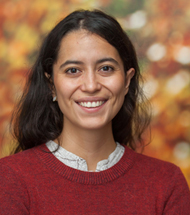40 million people worldwide are in need of palliative care and 80% of them are in resource-poor countries.
Faced with this demand, Natalia Arias, researcher of the ATLANTES Program at the University of Navarra, is committed to integrating this care into primary care.

PHOTO: Manuel Castells
An estimated 40 million people worldwide are in need of palliative care and 80% of them are in resource-poor countries. Natalia Arias, researcher at the Institute for Culture and Society (ICS) of the University of Navarra, recalled this figure in the framework of a colloquium organized by the ATLANTES Program of the center.
In view of this demand, he believes that "we must find a way to act. One way is to integrate this care into the first step of the healthcare system, in primary care. He indicates that along these lines, the World Health Organization (WHO) proposes evaluating the problem on the basis of four pillars: good policies, training of healthcare professionals, availability of drugs to combat pain and the creation of services.
Regarding the former, Arias comments that it is a matter of having "a legalframework that allows us to regulate who, how and when we protect". In the section of Education, he details that "the majority of recently graduated physicians do not have knowledge of pain control, they do not know the initiation dose of morphine" and that is why it is necessary to train them in this discipline.
Regarding the availability of drugs, he mentions that morphine, the one most commonly used to treat patients' pain, "is not patented, no pharmaceutical company has a monopoly on it and it costs four cents to produce. But it does not reach those who need it because of the difficulty in its regulation, political and economic interests, and the lack of knowledge in the way the medication is handled".
Finally, he argues that it is important that there are hospitals and health centers with teams trained to offer palliative care, and also highlights the importance of articulating services that are adapted to the needs of patients, especially in countries where the economic, political and social context requires the creation of home-based services.
"The development of indicators is not an easy task."From agreement with Natalia Arias, the palliative care community is faced with the task of determining how to measure the development of this care in the world. "The ATLANTES Program -she says- is a pioneer in this field, developing research projects that, through the enquiry and consensus of experts, scientific literature reviews and "think tanks", aims at identifying and elaborating the best indicators, applicable to the different regions".
However, "this is not an easy task," he explains, since "the problem lies in the creation of indicators that allow comparisons between countries with different contexts and realities. He raises the case of Europe, a region in which "homogeneity could be assumed in the development and availability of palliative care".
However, he states that "even in this region we see countries in which the lack of policies or services conditions a low coverage of national needs. For example, in some countries in the East there is no availability of morphine, consumption can be as high as 1:120 mg of morphine compared to the West."
The ATLANTES team, after producing the first atlas of palliative care in Europe, realized that there was a patron saint in what informants reported, an indicator not yet defined. "It is about the level of development of palliative care and its vitality, that is, how many organizations there are, how many volunteer teams, what activities they carry out...", assures Arias. He emphasizes that this is an example that "the environment of the research sector in palliative care is very dynamic", although he stresses that "there is still much to be done".
The ATLANTES Program at Institute for Culture and Society is supported by Banco Santander at framework through a agreement signed with the University of Navarra.





